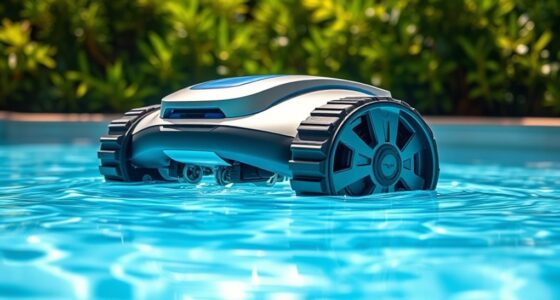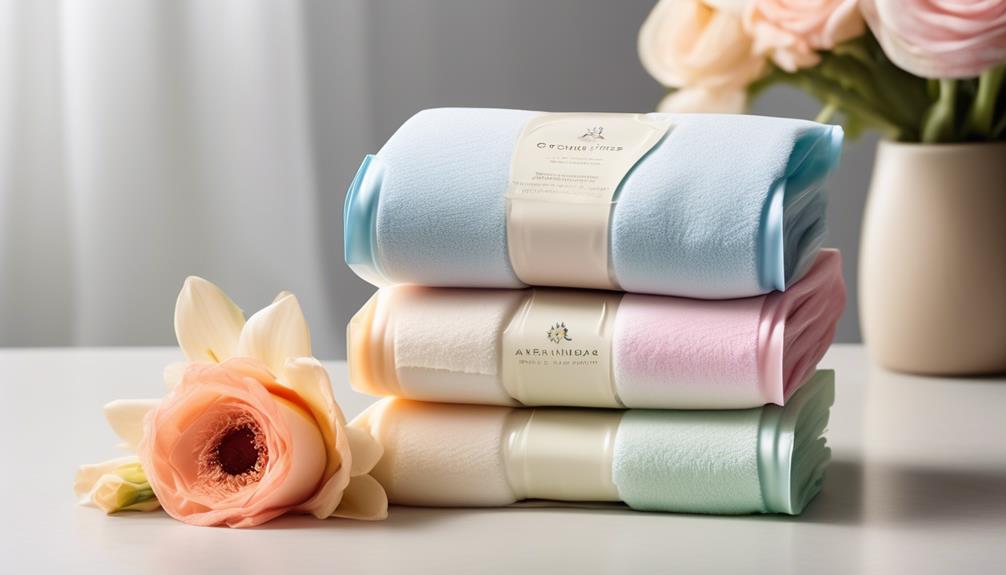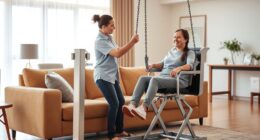I've come across the 15 best walkers designed for elderly individuals with dementia, which enhance mobility and prioritize safety. Rollators, like the Medline Steel Rollator with Seat, provide stability and comfort. Lightweight options, such as the Carex Folding Walker, create easy maneuverability. Features like adjustable heights, ergonomic handles, and anti-tip designs help reduce fall risks. It's essential to choose walkers that meet specific needs while ensuring user confidence. If you're looking to improve mobility and safety for your loved one, you might find even more helpful details and options that cater to their unique requirements.
Key Takeaways
- Choose walkers with a higher weight capacity (300 lbs+) to ensure safety and stability for seniors with dementia.
- Look for adjustable handle heights to promote proper posture and comfort for users of varying sizes.
- Select rollators with padded seating options for convenient resting and enhancing independence while on the move.
- Opt for lightweight and foldable designs for easy transport and storage, making mobility more manageable for caregivers and users.
- Prioritize walkers with reliable braking systems and anti-tip designs to enhance safety and prevent falls during use.
Medline Steel Rollator Walker with Seat for Seniors
The Medline Steel Rollator Walker with Seat is a fantastic option for seniors, especially those with dementia. Its durable steel frame can support up to 350 lbs, ensuring stability. I love how the ergonomic brake handles make it easy to use, and the adjustable height suits various users, although taller individuals might wish for more height options. The padded seat and backrest provide comfort, with handy storage underneath for personal items, which really enhances independence. Weighing just 16.5 lbs, it's also foldable for easy transport. I've noticed that many users appreciate the smooth movement provided by the 6-inch wheels. Overall, this walker considerably improves mobility and balance, making it a worthwhile investment for anyone needing a bit of extra support.
Best For: Seniors and individuals recovering from surgeries or managing mobility conditions who need reliable support and independence.
Pros:
- Durable steel frame supports a weight capacity of up to 350 lbs, ensuring stability.
- Ergonomic brake handles and adjustable height make it user-friendly for a variety of users.
- Padded seat and ample storage enhance comfort and independence during use.
Cons:
- Some users desire higher handlebar adjustments, which may affect posture for taller individuals.
- The walker can be challenging to collapse or fit in a car, especially for those with limited mobility.
- Reports of bending legs after misuse indicate the need for caution when using the walker.
Joy For All Companion Pet – Lifelike Animatronic Bird for Seniors
Imagine having a delightful companion that not only brings joy but also encourages movement—this is exactly what the Joy For All Companion Pet offers seniors with dementia. This lifelike bluebird isn't just a toy; it chirps and sings with realistic sounds, reacting to your voice and movements. I love how it perches on my walker, providing a comforting presence. When I stop walking, it plays a gentle "Don't forget me" song, reminding me to keep moving. This little bird helps alleviate loneliness and anxiety, making my day brighter. It's easy to use, attaches securely, and operates on AAA batteries. Overall, it fosters connection and joy, enhancing my interaction with both caregivers and family.
Best For: Seniors experiencing loneliness, social isolation, or cognitive decline, particularly those with dementia or Alzheimer's.
Pros:
- Provides companionship and reduces feelings of loneliness and anxiety.
- Encourages physical movement and interaction, improving engagement with caregivers.
- Easy to use and attach to walkers, enhancing mobility support.
Cons:
- Limited variety in songs and sounds may become repetitive over time.
- Some users report occasional activation issues with the sensors.
- Requires AAA battery replacements, which may be an inconvenience for some.
Medline Lightweight Folding Walkers for Seniors and Adults
For those seeking a reliable and easy-to-use mobility aid, the Medline Lightweight Folding Walker stands out as an excellent choice for seniors and adults, especially individuals managing the challenges of dementia. Weighing just 7 lbs, it's incredibly easy to maneuver, thanks to its 5" wheels. The sturdy steel frame supports up to 400 lbs, ensuring durability while providing stability with its side cross braces. I appreciate the push-button height adjustment, which makes it simple to customize for comfort. Plus, its lightweight, foldable design means you can easily store it or take it along while traveling. Users often rave about how straightforward the assembly is, making it a hassle-free addition to your mobility toolkit.
Best For: Seniors and adults seeking a lightweight and reliable mobility aid for enhanced stability and ease of use.
Pros:
- Lightweight design makes it easy to maneuver and transport.
- Sturdy steel frame supports a weight capacity of up to 400 lbs, ensuring durability.
- Push-button height adjustment allows for quick and convenient customization for user comfort.
Cons:
- Some users report sticky leg joint locks that may require lubrication for smoother operation.
- 5" wheels may not perform as well on very rough or uneven terrain.
- The included allen wrench for assembly is noted as average quality.
Walkers for Seniors Aluminum Lightweight Walker with Wheels
Finding the right walker can make a significant difference for seniors with dementia, especially when considering the Aluminum Lightweight Walker with Wheels. I've found this walker to be incredibly user-friendly. It's lightweight and easy to assemble, which means you won't struggle with complicated instructions. Plus, it folds easily for storage and fits well in a car trunk, making it perfect for outings.
What I appreciate most is its sturdiness; it supports up to 350 pounds while still being affordable. The adjustable height and width guarantee a comfortable fit for different body types, allowing for smooth navigation through doorways. Users rave about the glide feet, which provide effortless movement. Overall, it's a great option that combines safety, mobility, and convenience.
Best For: Seniors seeking a lightweight, sturdy walker that is easy to assemble and navigate.
Pros:
- Easy to assemble and fold for convenient storage.
- Supports up to 350 pounds, making it suitable for various body types.
- Glide feet enhance mobility, providing smooth movement.
Cons:
- May not be suitable for very narrow spaces due to width adjustments.
- Limited features compared to more advanced mobility aids.
- Some users may prefer walkers with additional accessories or storage options.
Drive Medical 2-Button Folding Walker with Wheels
The Drive Medical 2-Button Folding Walker with Wheels stands out as an ideal choice for elderly individuals with dementia, thanks to its user-friendly design and safety features. It supports up to 350 pounds and is made from lightweight aluminum, which makes it easy to handle. The five wheels guarantee smooth movement, while the cushioned vinyl hand grips provide comfort during use. Assembly is a breeze—just slide on the legs without any tools needed. I appreciate how the walker operates independently on each side, making it perfect for maneuvering tight spaces. Plus, the adjustable height allows for a custom fit. Overall, this walker offers great value and is highly recommended for enhancing mobility and safety.
Best For: The Drive Medical 2-Button Folding Walker with Wheels is best for elderly individuals seeking enhanced mobility and safety while maintaining ease of use.
Pros:
- Lightweight aluminum construction makes it easy to handle and transport.
- User-friendly design with a simple push-button mechanism for folding and unfolding.
- Adjustable height feature allows for a custom fit for various users.
Cons:
- Wear pads on rear legs may not be durable on abrasive surfaces.
- Some users noted the need for clearer assembly instructions.
- Adding ski glides may be necessary for improved maneuverability over uneven terrain.
Medline Aluminum Rollator Walker with Seat for Seniors
When seeking a reliable mobility aid for seniors with dementia, the Medline Aluminum Rollator Walker with Seat stands out for its lightweight design and sturdy construction. Weighing just 14 lbs and supporting up to 250 lbs, it's easy to maneuver, whether indoors or outdoors. I love the adjustable height feature, which accommodates different users comfortably. The padded seat and backrest provide a nice resting spot, although some might find it a bit small for extended periods. The under-seat bag is handy for personal items, but I'd recommend checking its durability with heavier loads. Overall, this rollator offers great value and enhances safety, making it an excellent choice for those needing mobility assistance.
Best For: Seniors needing a lightweight and portable mobility aid that enhances safety and comfort while walking.
Pros:
- Lightweight design makes it easy to maneuver and transport.
- Adjustable height accommodates various user heights for better comfort.
- Padded seat and backrest provide a comfortable resting spot.
Cons:
- Under-seat storage bag may lack durability under heavy loads.
- Brake quality can be inconsistent upon delivery, leading to potential issues.
- Seat size may not be suitable for extended sitting, especially for larger individuals.
Helavo All Terrain Upright Walker for Seniors
For seniors dealing with dementia, the Helavo All Terrain Upright Walker stands out with its soft padded armrests, providing essential comfort during walks. I love how its height-adjustable ergonomic handles promote a natural posture, reducing strain on my back and shoulders. The solid aluminum frame feels sturdy, supporting up to 300 lbs while remaining lightweight at 22.7 lbs. With ten rubber front wheels, it glides easily over various terrains, though I've noticed it can struggle a bit on gravel. Assembly took me just ten minutes, and the walker folds up for transport, making outings much easier. Overall, the Helavo walker boosts my confidence and stability, making every outing enjoyable and safe.
Best For: Seniors seeking a comfortable and stable mobility aid for outdoor activities and uneven surfaces.
Pros:
- Soft padded armrests and ergonomic handles provide comfort and reduce strain.
- Lightweight yet sturdy aluminum construction supports up to 300 lbs.
- Easy assembly and foldable design make it convenient for transport.
Cons:
- May struggle on gravel and soft dirt surfaces.
- Some users find maneuverability challenging initially.
- Folding mechanism could be improved for easier storage in car trunks.
Foldable Rollator Walker with Seat for Seniors
Finding the right mobility aid can be essential, especially for seniors with dementia who may need extra support and comfort while maneuvering their environment. The Foldable Rollator Walker with Seat is a fantastic option. Weighing just 20.4 pounds and featuring eight puncture-proof wheels, it glides smoothly across various terrains. I love that the adjustable handles and seat height accommodate users from 47 to 66 inches, ensuring a comfortable fit for everyone. The extra-wide memory foam seat and breathable backrest make resting easy, while the reliable braking system offers three modes for safety. Plus, its quick-fold design simplifies transport and storage. However, some users reported assembly issues, so keep that in mind when purchasing. Overall, it's a solid choice for enhanced mobility and safety.
Best For: Seniors seeking a lightweight and comfortable mobility aid with adjustable features for enhanced support and stability.
Pros:
- Lightweight design at 20.4 pounds allows for easy maneuverability.
- Extra-wide memory foam seat and breathable backrest provide maximum comfort during use.
- Quick-fold feature makes transport and storage convenient.
Cons:
- Reports of assembly difficulties, such as misaligned holes and missing screws.
- Some users experienced stability issues, with the walker pulling to one side.
- Concerns about the braking system's effectiveness, including difficulty in operation and inadequate stopping power.
Foldable Walker with Seat for Seniors
The Z21 foldable walker with a seat stands out as an ideal choice for seniors with dementia, thanks to its ergonomic bionic seat designed to relieve hip pressure. Weighing just 19.4 lbs, it's easy to carry and supports users up to 300 lbs. The innovative 3-second quick-folding design makes storage a breeze, and the widened breathable backrest offers excellent support. With 8 puncture-proof wheels, I can navigate various terrains comfortably. The highly sensitive braking system guarantees safety, while the ergonomic handle design is perfect for those with weaker grips. Plus, I love the detachable storage bag for shopping and the hidden compartment for personal items. For just $74 during Black Friday, it's an affordable investment in mobility and safety.
Best For: Seniors looking for a lightweight, easy-to-use mobility aid that provides comfort and safety while navigating various terrains.
Pros:
- Innovative 3-second quick-folding design allows for convenient storage and portability.
- Highly sensitive braking system enhances safety, accommodating different walking speeds.
- Detachable storage bag and hidden compartment offer practicality for shopping and secure storage of personal items.
Cons:
- May not be suitable for users over 300 lbs, limiting accessibility for heavier individuals.
- Initial assembly required, which, although tool-free, could be a challenge for some seniors.
- Limited color options may not appeal to all users looking for personalization.
OasisSpace Folding Walker with Arm Support for Seniors
One standout feature of the OasisSpace Folding Walker is its removable padded armrests, making it an excellent choice for seniors with dementia who may require additional support and comfort. This walker supports up to 300 pounds and boasts a sturdy aluminum alloy construction that's both durable and rust-resistant. I love the H-shaped design, which enhances stability and helps with gait improvement. The 5-inch wheels and adjustable height legs allow for easy navigation through doorways. Plus, it folds up easily for storage, fitting right into my car's backseat. While some users mention stability issues, the non-slip foot pads add a layer of safety, especially on wet surfaces. Overall, it's a versatile mobility aid that caters to various needs.
Best For: Seniors with mobility challenges who need additional support and comfort while walking.
Pros:
- Removable padded armrests provide extra comfort and support, ideal for seniors with dementia or those requiring additional assistance.
- Sturdy construction from aluminum alloy with an anti-rust finish ensures durability and can support up to 300 pounds.
- Tool-free assembly and easy folding make it convenient for storage and transport in a vehicle.
Cons:
- Some users report stability issues, including wobbling and misalignment of wheels, which may affect performance.
- A few individuals find the walker too tall for shorter users, impacting ease of use.
- Mixed reviews on overall ease of use, with some considering it flimsy compared to other models.
Secure Magnet Pull Cord Chair and Bed Alarm for Elderly Adults
For caregivers of elderly adults, especially those with dementia, the Secure Magnet Pull Cord Chair and Bed Alarm offers invaluable peace of mind. This device is a game-changer in fall prevention, alerting me when my loved one tries to get up unassisted. I appreciate its simple design, featuring adjustable volume and alert tones, ensuring I can hear it from another room. The break-resistant casing adds durability, while the magnet detaches easily, reducing false alarms. Installation is a breeze—I just insert batteries, attach the pull-string clip, and mount it. Users rave about its effectiveness, emphasizing that it's especially helpful for dementia patients. With a one-year warranty, I know I'm making a reliable investment in safety.
Best For: Caregivers of elderly adults, especially those with dementia or fall risk, seeking reliable fall prevention solutions.
Pros:
- Effective fall prevention: Alerts caregivers when patients attempt to get up unassisted.
- User-friendly design: Simple installation and operation with adjustable volume and alert tones.
- Durable construction: Break-resistant casing and a strong magnet reduce false alarms.
Cons:
- Clip difficulty: Some users may find the pull-string clip challenging to use.
- Battery dependency: Requires AAA batteries, which need to be replaced periodically.
- Limited customization: Fewer options for personalizing alert settings compared to other devices.
Goplus Folding Walker for Seniors
Designed with versatility in mind, the Goplus Folding Walker for Seniors stands out as an excellent choice for individuals with dementia or mobility challenges. I appreciate its multifunctional design, offering both interactive and fixed modes. The adjustable support feet and arm rests guarantee a customized fit, enhancing comfort. The ergonomic seat cushion feels great, especially during long rests, while the shock-absorbing wheels make for a smooth ride. Though it weighs 15 lbs and can be a bit bulky, I find the one-click folding mechanism convenient for storage. Users have noted mixed experiences regarding stability, but overall, it provides solid support for those needing extra assistance. Just keep an eye on the folding mechanism; it can be tricky at times.
Best For: Individuals with mobility challenges, joint issues, or those recovering from knee replacements who require a stable and comfortable walking aid.
Pros:
- Multifunctional design with interactive and fixed modes for versatile use.
- Adjustable features including support feet and arm rests for a customized fit.
- Shock-absorbing wheels provide a smooth ride, enhancing user comfort.
Cons:
- Bulky and heavy at 15 lbs, making transport somewhat cumbersome.
- Folding mechanism issues may require additional effort to properly fold the walker.
- Mixed stability experiences, with some users finding it wobbly under certain conditions.
Carex Lightweight Folding Walker for Seniors
The Carex Lightweight Folding Walker stands out as an excellent choice for seniors, particularly those dealing with dementia, due to its remarkable portability and ease of use. Weighing only 6 pounds, it's incredibly easy to maneuver, supporting up to 300 lbs. I love that it folds easily, making it a breeze to transport in my car. The adjustable height from 30 to 37 inches guarantees a comfortable fit, and the optional wheel attachment can enhance mobility even further. It provides stability when traversing curbs or getting up from seated positions, which is especially helpful post-surgery. While some users have faced minor assembly issues, the overall durability and user satisfaction make the Carex walker a reliable choice for maintaining independence.
Best For: Seniors and adults needing a lightweight, portable mobility aid for stability and independence.
Pros:
- Lightweight design at only 6 pounds makes it easy to maneuver and transport.
- Height adjustable from 30 to 37 inches to ensure a comfortable fit for various users.
- Durable construction supports up to 300 lbs and offers stability for navigating curbs and getting up from seated positions.
Cons:
- Some users have reported minor assembly issues or defects that affect stability.
- Caution is advised when purchasing from online retailers due to potential issues with item condition and return policies.
- Customer service may be challenging for older adults to navigate if they encounter problems with defective items.
Delog Folding Walker for Seniors
Many seniors with dementia struggle with mobility, and that's where the Delog Folding Walker shines. Weighing only 6lbs, it's lightweight and perfect for both indoor and outdoor use. I love that it fits through narrow doorways, accommodating spaces as tight as 20 inches. The adjustable width and height make it customizable for individual needs, which is a real plus. The click releasing trigger allows you to fold it easily without letting go of the handle, enhancing safety. Users appreciate its stability and comfort, but I've heard some concerns about durability, particularly with the back leg. Overall, it's a fantastic option for enhancing mobility, but I'd recommend keeping an eye on its long-term use to guarantee safety.
Best For: Seniors with mobility challenges, particularly those living in homes with narrow doorways.
Pros:
- Lightweight design at only 6lbs, making it easy to transport and maneuver.
- Adjustable width and height cater to individual needs and enhance comfort.
- Click releasing trigger allows for easy folding without compromising safety.
Cons:
- Some users have reported durability issues, particularly with the back leg.
- Limited long-term reliability based on user feedback.
- May require additional modifications for enhanced mobility and stability.
Drive Medical 4 Wheel Rollator Walker with Seat (10257RD-1)
For those caring for elderly individuals with dementia, the Drive Medical 4 Wheel Rollator Walker with Seat (10257RD-1) stands out with its sturdy steel frame and comfortable seating. This four-wheel rollator offers excellent stability, thanks to its durable construction and 7.5-inch caster wheels for smooth outdoor movement. I appreciate its height-adjustable handles, making it suitable for various users, and the under-seat storage pouch is handy for carrying belongings. The design folds easily for transport and storage, maintaining a standing position when folded. While the seat is a bit lacking in padding, it provides a secure place to rest. Overall, this rollator combines functionality with comfort, making it a great choice for enhancing mobility and safety.
Best For: Individuals recovering from surgery or facing mobility challenges who need a stable and comfortable walking aid.
Pros:
- Durable construction with a sturdy steel frame and smooth 7.5-inch caster wheels for outdoor use.
- Height-adjustable handles accommodate various user heights for personalized comfort.
- Convenient under-seat storage pouch for carrying personal belongings while on the go.
Cons:
- The seat may lack sufficient padding, which could affect comfort during extended use.
- Folding the rollator requires removing the storage basket, which may be inconvenient for some users.
- The design does not allow for multidirectional movement of the back wheels when seated, necessitating caution while moving.
Factors to Consider When Choosing a Walker for Elderly With Dementia

When choosing a walker for someone with dementia, I think it's essential to focus on safety features and ease of use. You'll want to take into account weight capacity and how easily it can be adjusted for comfort. Portability and storage options also play a big role in making sure it fits into daily life.
Safety Features Importance
Choosing a walker for an elderly loved one with dementia requires careful consideration of safety features that can greatly impact their mobility and well-being. First and foremost, I look for walkers with anti-tip designs and sturdy frames. These elements are essential for preventing falls and ensuring stability while moving. Additionally, it’s important to select a walker that is appropriate for the individual’s height and strength, as proper fit can enhance their confidence and encourage independence. I also recommend exploring options such as walkers with built-in seats for those times when they need to rest while out and about. For those who may not require a walker but still need some assistance, researching the best canes for elderly support can provide valuable alternatives that promote mobility and balance.
Ergonomic handles and adjustable heights are also vital. They help maintain proper posture and minimize strain, which reduces the risk of accidents caused by discomfort. A reliable braking system is another feature I prioritize. It allows my loved one to stop safely when needed, giving them greater control and peace of mind.
I also appreciate walkers with integrated storage options. This feature lets users carry personal items without the risk of losing balance, which can lead to distractions and accidents. Finally, visibility features like reflective strips or bright colors make the walker more noticeable to caregivers and others, enhancing safety during navigation in various environments.
Weight Capacity Considerations
Understanding the weight capacity of a walker is important for ensuring the safety and comfort of an elderly loved one with dementia. When selecting a walker, I always check the weight capacity, which usually ranges from 250 to 400 lbs, depending on the model. A higher weight capacity is essential for stability, especially for those who might experience muscle weakness or fluctuations in weight.
For individuals with dementia, I often recommend walkers that can support at least 300 lbs. This added robustness helps provide the necessary support for both mobility and balance, making it easier for them to navigate their surroundings. It's also important to take into account the user's physical condition and any potential weight changes during their care.
Choosing a walker with an appropriate weight capacity not only enhances safety but also boosts the user's confidence and independence. When they feel secure, they're more likely to use the walker consistently, which can lead to improved mobility and overall well-being. So, take the time to evaluate weight capacity carefully, ensuring it aligns with your loved one's needs.
Ease of Use
While selecting a walker for an elderly loved one with dementia, ease of use is an essential factor to keep in mind. I always look for walkers that feature simple and intuitive folding mechanisms. This makes it easier for seniors with cognitive challenges to handle them without frustration. Ergonomic grips and controls that require minimal strength are also a must. They guarantee that individuals with limited dexterity can use the walker comfortably.
Another key aspect is the weight of the walker. Opting for lightweight frames enhances maneuverability and reduces the effort needed to transport or adjust the walker. I find that seniors are more likely to use a walker that they can manage easily.
Additionally, clear visual indicators or color-coded features can be incredibly helpful. These design elements assist seniors with dementia in understanding how to operate the walker effectively. By considering these factors, I can help guarantee that my loved one feels confident and safe while using their walker, enhancing their mobility and overall quality of life. Choosing the right walker can truly make a difference in their daily activities and independence.
Adjustability for Comfort
After considering ease of use, adjustability for comfort becomes an essential aspect when selecting a walker for someone with dementia. I've found that choosing a walker with adjustable handle heights, typically between 31 to 36 inches, is important for ensuring proper posture and comfort. It helps users maintain a natural walking position, which can reduce strain.
Additionally, I recommend looking for walkers with adjustable seat heights. This feature is particularly beneficial for those who may need to rest frequently. Having multiple seat height options can enhance accessibility and comfort.
Another factor to keep in mind is adjustable widths. A walker that can fit through doorways and navigate narrow spaces makes a noteworthy difference, especially for users who might not be fully aware of their surroundings.
Ergonomically designed handles that adjust to the user's grip strength are also essential. They can prevent discomfort and encourage more frequent use. Finally, a lightweight and foldable design with adjustable components not only promotes convenience for caregivers but also makes storage and transport much easier. All these features combined can greatly enhance the mobility and safety of elderly individuals with dementia.
Portability and Storage
When selecting a walker for someone with dementia, portability and storage are essential factors to reflect upon. I've found that lightweight and foldable designs are invaluable. They make it easy to transport the walker and store it in tight spaces, like car trunks or closets. Look for models with a compact folding mechanism that allows for quick storage without the hassle of removing any parts.
Weight is another important aspect. Ideally, the walker should weigh under 20 pounds, which makes it more manageable for the user to lift and maneuver. It's also helpful to choose walkers that feature a convenient carrying handle or strap, enhancing portability when moving from one location to another.
Lastly, a compact footprint is essential. Walkers that can easily navigate narrow doorways and tight spaces around the home can greatly improve daily life for someone with dementia. By keeping these factors in mind, you can choose a walker that not only supports mobility but also fits seamlessly into the user's lifestyle, providing both freedom and safety.
Stability on Various Terrains
Choosing a walker that's portable and easy to store is just the beginning; guaranteeing it provides stability on various terrains is vital for safety. I've seen how uneven surfaces, like cobblestones or gravel, can pose significant risks for elderly individuals with dementia. That's why I recommend looking for walkers equipped with larger, puncture-proof wheels. These wheels typically offer better stability and make maneuvering obstacles much smoother.
A sturdy frame and a reliable braking system are also important features. They enhance stability when stopping or resting on inclines or uneven ground. You'll want to verify the walker can handle different terrains without compromising safety. Adjustable height features are another aspect to take into account; they allow for a more natural walking posture, which can improve balance and stability.
Lastly, I can't stress enough the importance of ergonomic designs. Walkers that promote upright walking help alleviate discomfort and boost control, increasing stability in various environments. By focusing on these factors, you can choose a walker that supports mobility and safety for elderly individuals with dementia, making every step a little more secure.
Interactive Features for Engagement
Incorporating interactive features into walkers can greatly enhance the engagement of elderly individuals with dementia. I've found that technologies like voice-activated responses and sensory stimuli can provide essential mental stimulation and emotional connection. For instance, devices such as CHIRPBACK respond to user actions, encouraging movement and interaction, which helps combat feelings of loneliness and social isolation.
I also appreciate walkers that come with built-in reminders or songs; these can trigger positive memories and reinforce routines, benefiting cognitive function and emotional well-being. When seniors can carry personal items in integrated storage, they have the opportunity to spark conversation and reminiscence, promoting autonomy and connection with others.
Moreover, aesthetically pleasing designs combined with interactive elements can motivate seniors to use their mobility aids more frequently. This increased usage not only promotes physical activity but also enhances their overall quality of life. As I explore options, I keep these interactive features in mind, knowing they can make a significant difference in how engaged and connected elderly individuals with dementia feel in their daily lives.
Durability for Long-term Use
Interactive features can enhance the experience of using walkers, but durability is just as important for guaranteeing long-term use, especially for elderly individuals with dementia. When I choose a walker, I always prioritize high-quality materials like aluminum or steel. These materials not only provide enhanced durability but can also support higher weight capacities, often up to 400 lbs.
I recommend looking for walkers with reinforced frames and robust construction. These features greatly contribute to the product's longevity and can withstand the daily wear and tear. It's also wise to take into account models that come with a warranty or guarantee; this shows the manufacturer's confidence in their product and gives me peace of mind against defects.
Don't overlook walkers that have undergone rigorous testing for stability and strength. This guarantees they can endure the demands of long-term use, especially for those facing mobility challenges. Finally, I prefer models with easy maintenance features, such as adjustable parts that can be tightened or replaced. This way, I can keep the walker in ideal condition throughout its lifespan, securing safety and support for my loved one.
Frequently Asked Questions
How Can I Encourage My Loved One to Use a Walker?
I know encouraging a loved one to use a walker can be challenging. I've found that talking openly about their mobility needs helps. I emphasize the benefits, like increased independence and safety. Sometimes, I'll suggest trying it out together, making it a positive experience. Personalizing the walker with their favorite colors or stickers can also make it more appealing. Most importantly, I offer my support, so they feel confident using it.
What Are the Signs My Loved One Needs a Walker?
I've noticed a few signs that made me realize my loved one might need a walker. They started to stumble or feel unsteady when walking, and I saw them gripping furniture for support. Their fatigue increased after short walks, and they often expressed fear about falling. I also observed a reluctance to go out, which worried me. Recognizing these signs helped me understand that a walker could really enhance their mobility and safety.
Are There Walkers Specifically Designed for Dementia Patients?
Ever wondered if there's a walker tailored for someone with dementia? I've found that there are indeed walkers designed with their unique needs in mind. These walkers often include features like added stability and bright colors to enhance visibility. They're not just functional; they can also provide a sense of security and independence. When choosing one, I always think about comfort and ease of use, so my loved one feels confident while moving.
How Do I Properly Adjust a Walker for My Loved One?
To properly adjust a walker for your loved one, start by having them stand straight in their usual shoes. The handgrips should align with their wrists when their arms hang naturally by their sides. Adjust the height accordingly, making sure it's comfortable for them. It's crucial to check that the walker's wheels are secure and functioning. Once adjusted, encourage them to test it out to verify it feels right and provides the support they need.
Can Walkers Help Reduce the Risk of Falls for Dementia Patients?
Absolutely, I believe walkers can greatly reduce the risk of falls for individuals with dementia. They provide stability and support, helping to maintain balance while walking. I've seen how a good walker can encourage mobility and boost confidence, allowing loved ones to move around more freely. Just remember to choose a walker that's easy to use and fits their needs, as that can make all the difference in keeping them safe.
Conclusion
In choosing the right walker for someone with dementia, you're not just picking a tool; you're opening a door to greater independence and safety. Each option on this list has unique features to cater to different needs, so take your time to find the perfect fit. Remember, enhancing mobility can be like giving a bird its wings back—allowing your loved one to explore the world with confidence and comfort. They deserve that freedom!

























